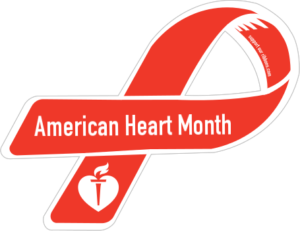
Happy February to all of our valued clients of SunRay Drugs! Recognized as Black History Month, February is the time of year where we can appreciate the contributions of African Americans to U.S. history while filling the air with love and affection for Valentine’s Day. Speaking of all things heart-related, February is also recognized as American Heart Month, which reminds us to take care of our hearts and spread awareness of cardiovascular health. As such, I want to do my share of spreading awareness!
First and foremost, I want to express how important it is to take care of the heart. Did you know that heart disease is the leading cause of death in both men and women in the United States? According to the Centers for Disease Control and Prevention (CDC), more than 600,000 Americans die of heart disease every year— which means that 1 in every 4 deaths is caused by heart disease! In the U.S., someone has a heart attack every 40 secs, and more than one person die from heart disease each minute. This just goes to show how scary heart disease can be, yet it is very common within our community!
The reason I wanted to share these statistics is because I have recently witnessed the result of heart disease right before my own eyes, and it scared me as well. Just a few days ago, I was riding the Septa train on my way home while listening to music to seclude myself. In the midst of Ariana Grande’s new hit song “7 rings”, I heard a loud, hoarse cry for help from behind me. Confused, I slowly turned myself around to find an elderly man lying on the ground of the subway train, clutching his hand over his heart as he cringed to the immense pain he felt. Stunned, I froze in fear, regretfully thinking to myself that this man before me was either truly suffering from a heart attack or faking it for attention. One of the passengers asked if he was okay, yet the man laid unresponsive due to the excruciating pain in his chest— that’s when I knew this was real. I rushed over to the man and nudged him harshly to make sure that he was conscious. Thankfully, the suffering man responded and told me that he felt so much pain in his heart and that he had heart attacks before. As soon as the subway train reached its next destination, I ran to the operator box to announce to the authorities that this man was suffering and that he needed to go to the hospital immediately.
Heart attack and stroke are heart conditions that can come from high cholesterol levels, uncontrolled blood pressure, and smoking. To prevent you from experiencing what the man had gone through, make sure to do your heart a favor by avoiding cigarettes, exercising for about 150 minutes per week with moderate-intensity aerobic activities (i.e. brisk walking, running, biking), lowering the amount of salt and fatty or greasy foods that you eat, and checking and recording your blood pressure regularly. I cannot but express how important changing lifestyle habits is in making a difference between living a happier, healthier life and being hospitalized for a condition that makes one suffer so much.
Because of this experience, I wanted to inform about the signs and symptoms of heart attack and stroke so that you recognize an emergency when you see one. Those undergoing a heart attack usually experiences chest discomfort that can last for more than a few minutes. Ask if he or she has an uncomfortable pressure, squeezing, or painful sensation in the chest and if there is any pain radiating to one or both arms, jaw, or stomach. Observe if the individual feels short of breath. If the person is experiencing these symptoms, please call 911 for help. Other signs that may occur are cold sweats, nausea, or lightheadedness.
To recognize a stroke, the FAST acronym is used and is as follows:
- Face drooping – Is there numbness in one or both sides of the face? Can the person smile? Those with stroke may have a hard time doing so.
- Arm weakness – Is there numbness in one or both arms? Ask the person to raise both arms. Those with stroke may have a difficult time raising one or both arms.
- Speech difficulty – Is the person hard to understand, has slurred speech, or unable to speak? If so, this is most likely a sign of stroke.
- Time to call 911 – If the person has any of these signs, call 911 immediately, even if these signs appear to go away.
Thank you for taking the time to read this, and I hope that you spread love not only to others, but to yourselves as well by checking the status of your heart with your doctor today.
This article was written by student pharmacist Vincent Louanphom.
References:
https://www.cdc.gov/heartdisease/facts.htm
https://www.heart.org/en/about-us/heart-attack-and-stroke-symptoms
